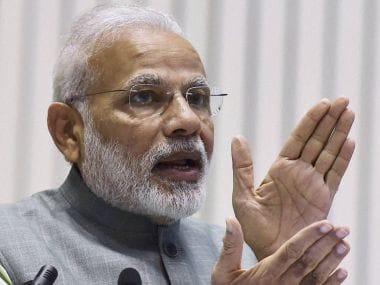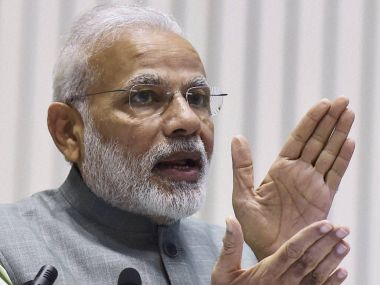My math teacher at school, Yagyanarayanan, slapped me across my face when I, as a callow youth, helped my seat-mate copy from my answer sheet. It was a stinging blow, the one that has had a more durable impact on my world view of corruption — the one who plays ball in cheating of any hue is more to blame. The rechristened law on benami, Prohibition of Benami Transactions Act, 1988, implicitly endorses this worldview — an abettor to a benami transaction also faces penalty and jail rap upto seven years. To be sure bulk of the monetary penalty is on the beneficial owner who uses a benami-–the property held benami would be confiscated but in addition he will have to brace himself for a double whammy i.e. coughing up 25 percent of the market value of the property held benami as penalty. But the ostensible owner or benami owner also faces the grim prospect of going to jail. [caption id=“attachment_3137758” align=“alignleft” width=“380”]  Prime Minister Narendra Modi. PTI[/caption] There are reports of crooks laundering their demonetized 500 and 1000 rupee notes by genuflecting before the poor Jan Dhan account holders in the hope that they would do their bidding and return the money at a propitious time. Service charges of course would be paid for acting as launderers. The cover of agricultural income, the crooks believe, would keep the tax sleuths at bay. The crooks would also presumably have taken care to mobilize a large number of abettors because the income tax law requires PAN (permanent account number) to be mentioned on the deposit slip if the amount of cash deposit exceeds Rs 50,000. While the number of front men thus being enlisted is in the realm of speculation, reports doing the rounds speak of a hefty Rs 65,000 crore having been thus far deposited in the Jan Dhan accounts that were till recently lying dormant. That they have sprung to life post-demonetization lends credence to the suspicion of rampant laundering happening. On Saturday, 3 December, Prime Minister Modi was addressing a parivartan rally in Moradabad, UP. He told the cheering crowd that he was wracking his brain on how to reward the Jan Dhan account holders into whose bank accounts crooks have deposited the demonetized currency notes. While his promise of reward could raise eyebrows inasmuch as the account holders were complicit in the crime of encouraging benami properties and as such should be punished instead of being rewarded, in fairness to the Prime Minister it must be conceded that he urged them not to withdraw from the accounts to the extent crooks have embellished them in order to return the money to the crooks. The gullible (or not-so-innocent?) Jan Dhan holders could be taken in by the promise which may be difficult to keep in the back-to-back or one-to-one sense. The government may come up with schemes for the general welfare of the poor. But then the promise took on the hue of a direct and not vicarious reward. I must however hasten to play the devil’s advocate. Some of the Jan Dhan account holders might be victims of collusion between bank officials and crooks. In other words, crooks might have been supplied with the names and account numbers of the benighted Jan Dhan account holders. In such cases, of course, they cannot be proceeded against with the villainous bank officials taking the rap. Be that as it may. Modi was skating on thin ice when he made this promise. If he launches anti-poverty schemes and says he has thus fulfilled his promise, the account holders are bound to feel cheated. And if he sets out to reward them say by way of 15 oercent of the amount deposited into their accounts in unearthing which they have played a pivotal role, he would be pilloried for doing the unthinkable — rewarding the abettors in creation of benami properties! Even the innocent i.e. those done in by the collusion between bank officials and crooks cannot be rewarded directly.
The government may come up with schemes for the general welfare of the poor. But then the promise took on the hue of a direct and not vicarious reward.
Advertisement
End of Article


)

)
)
)
)
)
)
)
)



